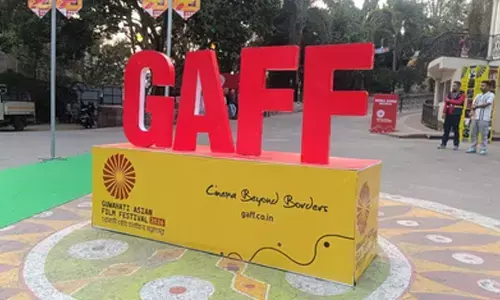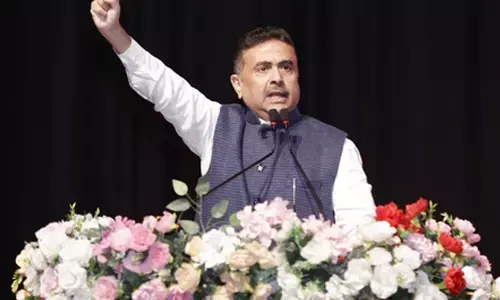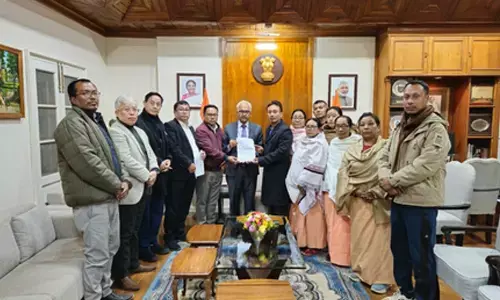First violent protests: Now revolt against Centre!

After passing of resolution by the Kerala Assembly opposing the recently made law called, the Citizenship (Amendment) Act, 2029 (CAA) by an overwhelming majority by Parliament
After passing of resolution by the Kerala Assembly opposing the recently made law called, the Citizenship (Amendment) Act, 2029 (CAA) by an overwhelming majority by Parliament, there should not remain any doubt that the Congress, Left and their cronies are hell-bent upon creating anarchy in the country with a view to ensure further division of the country.
Earlier, the State government of West Bengal and. several other Opposition ruled States have already proclaimed defiance to the duly enacted Law.
Obviously, this is not permissible under the Constitution of India. The Constitution has already demarcated the subjects on which the States and the Union of India have exclusive prerogative to enact laws.
Besides, it has also provided for a list of subjects on which both the States and the Union of India can enact laws. This being the case there is no question of any tussle.
The CAA squarely falls under the Union of India list. Before taking the shape of an Act, the Bill has passed through several designated steps in Parliament.
The Bill was elaborately discussed and debated in the Lok Sabha as well as the Rajya Sabha. All political parties were granted enough opportunity to voice their concern on the subject matter of the Bill.
Finally, after considering the amendments moved by several members, the Bill was passed by a thumping majority in both cases Houses. It became the law after receiving the assent of the President of India and publication in the official gazette.
This being the case, the law has become absolute and binding on all the people of India. There is no question of not abiding it. Kerala Governor Arif Mohammed Khan has rightly opposed the resolution passed by the Assembly terming it ultra vires and unconstitutional.
In fact, the act of adopting a resolution opposing the duly passed law by Parliament tantamounts to defying the authority of the Constitution and undermining the supremacy of Parliament.
Therefore, the Governor should at once recommend the dissolution of the Assembly and dismissal of the State government followed by imposition of President's Rule.
Further, the individuals responsible for the treacherous act should be booked for treason and prosecuted as per law. The Central government should not soft-paddle this very serious matter and swing into action irrespective of the political status of the culprits. Remember, the law recognises the offence, and not the offender.
From the recent large-scale arson and violence unleashed by the anti-national elements, it has become crystal clear that the crestfallen political parties at the last general elections are desperate to gain control over administration by hook or by crook. Fortunately, the government of the day is capable enough to take upon such elements and crush them mercilessly.
Needless to say, the people of the country are solidly behind the democratically elected competent government and assist the law and order maintaining agencies to keep the trouble makers under check.
SC on abetment to suicide
In an important judgement on the abetment, the Supreme Court has held that merely because the husband has been convicted for the offence of Section 498-A of the Indian Penal Code and the death of the wife occurred within seven years of marriage, the husband cannot be convicted for the offence of abetting suicide of his wife in a mechanical manner.
The prosecution will have to prove the allegation of abetment to suicide to the satisfaction of the court, it added.
The division bench of Justices Navin Sinha and Gavai held that the accused husband's conviction under Section 306 of IPC based on the presumption under Section 113 of the Evidence Act could not be sustained. Accordingly, conviction of the accused under Section 306 IPC was set aside.
Pak amends law for General Bajwa
After the Supreme Court's plain-speaking on the subject of extension of General Qamar Bajwa's services by three years, the Imran Khan government went into a huddle and promptly introduced a Bill authorising the Prime Minister to grant extension to the General.
The Bill is all set to be made into a law considering the fact that the opposition has no guts to effectively stall the move.
In the history of Pakistan, this is for the first time that the law is amended to facilitate the retiring Army Chief to cling on the plum position.
Significant judgement
In a significant judgement dated December 24 on Trade Marks, the Calcutta High Court has held that there is no infallible principle that the God's names cannot be registered as Trade Marks.
The division bench of Justices I P Mukerji and Mohd Nizamuddin delivering the judgement in Shyam Steel Industries Limited Vs Shyam Sel and power industry Limited & Anr observed that the petitioner had failed, even prima facie, to prove that the God's name cannot be registered as Trade Mark.
However, citing its earlier judgement in Lal Babu Priyadarshi Vs Amrit Pal, AIR 2016, SC 461, the court observed that the names of holy books, such as Quran, Ramayan, Granth Sahib , Bible etc, cannot be registered as trademarks.
The High Court verdict in our opinion lacks logic. Extending the same corollary as the religious books, the icons of different religions too, are the common preserve of different religions.
Obviously, it would be quite illogical to think that the name 'Shyam' is just a generic term and therefore, can be adopted by any body as his exclusive intellectual property.
HC seeks details of Secretariat cost
Adding to the woes of the government which is fully geared up for the construction of new building to house its Secretariat, the High Court has now asked the government to submit full details such as building plan, cost of construction, budgetary provisions etc, before it can get the green signal from the High Court.
Meanwhile some women activists have toyed up with an idea of setting up the first Women University of Telangana State in the existing Secretariat.
SC explains intent of Child Marriage Act
Observing that the intent of Section 9 of the Prohibition of Children Marriage Act , 2006 was not to punish a male child between the age of 18 years and 21 years, Justice Mohan S Shantanagoudar of the apex court said and added that a woman marrying the boy in this age group also cannot be punished considering the prevailing social conditions in the country where the system of arranged marriages has been in vogue and the girls have no say in the matter.
The apex court's verdict relates to the case of Haryana where a boy below the age of 21 years was married off to a woman of 21 years of age.














